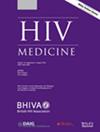Efficacy and safety of bictegravir/emtricitabine/tenofovir alafenamide in Black and Hispanic/Latine adults with HIV-1 initiating first-line therapy: 5-year follow-up from two phase III studies
Abstract
Introduction
Black and Hispanic/Latine people are disproportionately affected by HIV-1 and may have a greater risk of comorbidities than non-Black and non-Hispanic/Latine people with HIV. However, they have historically been underrepresented in HIV clinical studies. We aimed to assess the efficacy and safety of first-line antiretroviral therapy with bictegravir/emtricitabine/tenofovir alafenamide (B/F/TAF) over 5 years in Black and Hispanic/Latine people with HIV.
Methods
We present two post hoc pooled analyses of participants who received B/F/TAF up to week 240 in studies 1489 (NCT02607930) and 1490 (NCT02607956). Outcomes were compared between self-identified Black and non-Black participants and between Hispanic/Latine and non-Hispanic/Latine participants, including baseline characteristics, proportion with HIV-1 RNA <50 copies/mL, change in CD4 cell count, adherence, changes in metabolic parameters, and treatment-emergent adverse events.
Results
Overall, 211 Black, 421 non-Black, 155 Hispanic/Latine, and 477 non-Hispanic/Latine participants received B/F/TAF up to week 240. At baseline, median ages were 30–34 years, and 84%–91% were male at birth. At week 240, high proportions of Black (97%), non-Black (99%), Hispanic/Latine (100%), and non-Hispanic/Latine (98%) participants had HIV-1 RNA <50 copies/mL. Black people with HIV were more likely than non-Black people with HIV to have low (<85%) adherence (11% vs. 5%; p = 0.0074). Changes in CD4 count, metabolic and renal parameters, and treatment-emergent hypertension and diabetes were generally similar between Black and non-Black and Hispanic/Latine and non-Hispanic/Latine participants. A smaller proportion of Black than non-Black people with HIV experienced study drug-related treatment-emergent adverse events (20% vs. 32%; p = 0.0026).
Conclusions
These results demonstrate the durability and long-term safety of B/F/TAF in Black and Hispanic/Latine people with HIV.


 求助内容:
求助内容: 应助结果提醒方式:
应助结果提醒方式:


